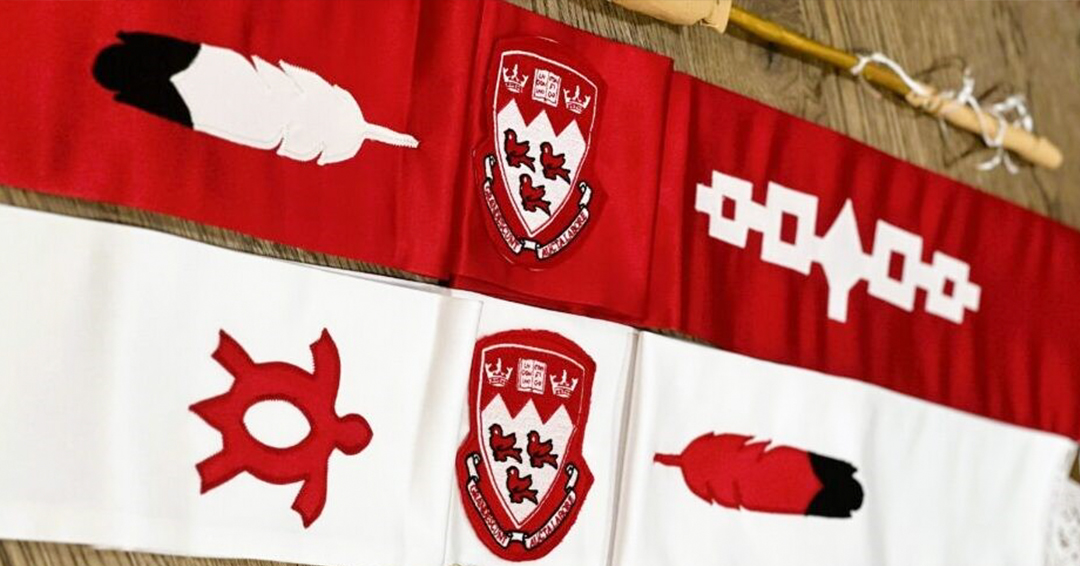
McGill’s spring Convocation kicked off Thursday, May 22, with the scarf ceremony honouring 95 Indigenous students who completed degree programs or certificates, including eight from the Faculty of Medicine and Health Sciences in medicine, physical therapy and surgical innovation. It marked one of the University’s largest cohorts of First Nations, Métis and Inuit graduates.
Emotions ran high during the online ceremony, especially during the open mic portion when graduating students and their friends and families were invited to share their thoughts.
Lisa Johnson spoke with pride of her child Raymond Jordan Johnson-Brown, who had earned a BA in Gender, Sexuality, Feminist and Social Justice Studies.
“What you’ve achieved, is more than a degree. It is a reflection of your strength, your spirit and your commitment to justice, identity and healing,” said Johnson. “Every part of your education has been rooted in truth, equity and care.”
Johnson praised her child’s work outside the classroom advocating for Indigenous education.
“You’ve created space, you’ve changed minds, you’ve built bridges. You are not just part of change, you are change; quiet, consistent and powerful,” she said, voice breaking with emotion. “I want you to know how proud I am of you, not for just what you’ve done but how you walk in this world with compassion, with integrity and with the deep sense of responsibility for the communities you love. You are light to our people, and you are light to me.”
It was at once both a mother’s deeply personal testimony to her son, and at the same time one that captured the spirit of pride and community responsibility that permeated the ceremony.
Responsibility to community
That theme of responsibility to community was present right from the opening Words Before All Else of Elder Otsi’tsaken:ra (Charlie Patton) from Kahnawa:ke.
“I believe the Creator chose you to be on this path from the moment you were born, all the way along your journey as children until you grew and you came to this road to get this education. You’re gathering all the way along the tools the Creator intended you to get so that you can now use them to help your people,” he said. “Always love the people that you came from and the person you have become.”
Yan Vollant, who earned his MBA, spoke in the open mic session of the challenges of pursuing a degree while working full time and fulfilling family responsibilities. But, he said, the moments of doubts and late nights were worth it because, as per the words of Otsi’tsaken:ra, he is now better equipped to help his community.
“At the place I work, Institut Tshakapesh, we focus on integrating Indigenous identity and culture into every part of our system, from education to governance. Completing this MBA will give me tools to carry this mission even further to make sure our values are reflected not only in our work but as we grow as an organization as well,” said Vollant.
‘Use your voice because it is powerful’
Keynote speaker Veldon Coburn, Associate Professor and Faculty Chair of the Indigenous Relations Initiative within the School of Continuing Studies, highlighted the challenges faced by Indigenous students within colonial institutions, and about the importance of not compromising one’s truth.
“Today is more of a victory,” said Coburn. “Because for Indigenous students, graduating isn’t just about completing a program, it’s about navigating institutions that were never designed to recognize your brilliance. It’s about walking through halls built on colonial foundations carrying knowledges that predate every brick and beam. It’s about surviving the silence when your history isn’t taught and when your identity is misunderstood and when your very presence is questioned.”
“You’ll be told I’m sure in sometimes subtle and often times in not-so-subtle ways to soften your voice, to make yourself more palatable, to compromise your truth for the sake of comfort or convention,” he said. “But my advice is don’t, don’t do any of that. Speak your truth. Use your voice because it is powerful. Use it to challenge, to build, to uplift. Use it to hold space for others just as you once hoped somebody would hold space for you.”
“You carry the hopes of your ancestors and the promise of those yet to come,” said Coburn. “So, for today let’s celebrate. Let your family and community wrap around you. Let this be a reminder that you are never alone and that your success belongs to many.”
‘Another tool in the toolbox’

Celeste Pedri-Spade, Associate Provost Indigenous Initiatives), pointed out that formal post-secondary education is only part of the graduates’ education.
“Today’s ceremony is part of [McGill’s] commitment to create an inclusive and open environment that values and celebrates Indigenous members of our community. It’s a ceremony that honours the legacy of Indigenous student success, and it honours Indigenous knowledge systems that have been around long before McGill was even an idea.”
Pedri-Spade spoke of Treaty 3 Elder Alex Skead, who said “our education as Anishinaabeg started as soon as we were born to our lands, to our families, to our communities, and education began in hearing our languages, being in our lodges, hearing our songs.”
“He said no matter where we went to learn, at universities like McGill, we would filter everything through an Anishinaabe lens informed by our original ways of being,” said Pedri-Spade. “We would take what we needed to from universities, and we would consider what we learned as just another tool in our toolbox to be put to use for the benefit for our families, our communities and our homelands.”
All McGill faculties were represented in this year’s cohort of Indigenous graduates, from Arts, Education and Agricultural and Environmental Sciences, to Music, Law and Medicine and Health Sciences.
